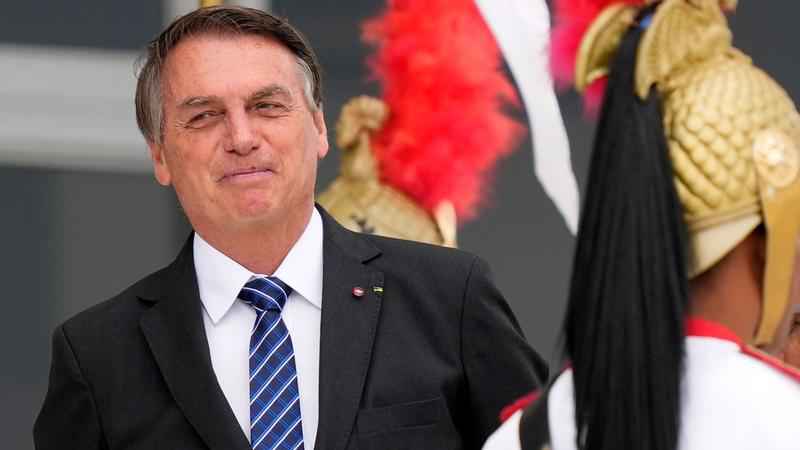Senate report to urge Bolsonaro be charged over pandemic

Brazilian President Jair Bolsonaro waits for the arrival of Colombia's President Ivan Duque to Planalto presidential palace in Brasilia, Brazil, Tuesday, Oct. 19, 2021.[AP Photo/Eraldo Peres]
A Senate report to be presented Wednesday will recommend President Jair Bolsonaro be indicted on criminal charges for allegedly bungling Brazil’s response to the COVID-19 pandemic and pushing the country’s death toll to second-highest in the world, according to members of the committee that will vote on it.
The report, which is based on six months of work by the committee, calls for Bolsonaro to be indicted on nine charges, from charlatanism and inciting crime all the way up to crime against humanity, according to two members of the committee that has been investigating the government’s handling of the pandemic. They agreed to discuss details of the report ahead of its formal, public presentation only if not quoted by name.
The report can still be modified before the committee vote on Oct. 26, and the decision on whether to file most of the charges would be up to Brazil’s prosecutor-general, who was appointed by the president.
Analysts say it’s unclear if he would act.
Recommended charges also include misuse of public funds and "prevarication," which entails delaying or refraining from action required as part of a public official’s duty for reasons of personal interest.
Bolsonaro has denied any wrongdoing, and has repeatedly accused the investigation of being a political instrument aimed at sabotaging him.
Critics have denounced Bolsonaro for downplaying COVID-19’s severity, ignoring international health guidelines on masks and restrictions on activity designed to prevent the virus’ spread, touting unproven treatments and delaying the acquisition of vaccines.
Anger over the president’s response prompted creation of the Senate committee in April, which has investigated allegations that Bolsonaro’s management of the pandemic caused many of Brazil’s more than 600,000 deaths from the disease.
Sen. Renan Calheiros, who drafted the report, was scheduled to present its final version Wednesday to the 11-person committee. An earlier draft had nearly 1,200 pages.
The document has to be approved by the committee before being sent to the office of the prosecutor-general, who would decide whether to carry forward the investigation and eventually pursue charges. In Brazil, members of congressional committees can investigate, but don’t have the power to indict.
Regardless of whether the prosecutor-general acts, the report’s allegations are expected to fuel criticism of the far-right leader, whose approval ratings have slumped ahead of his 2022 reelection campaign.
"The major impact of the investigation is political, because it generated tons of news that certainly will be used by campaign strategists next year," said Thiago de Aragão, director of strategy at political consultancy Arko Advice.
Even during the worst throes of the pandemic, Bolsonaro steadfastly restrictions on activity, claiming the poor would suffer worse hardship if the economy ground to a halt. He continues to argue that the anti-malarial drug hydroxychloroquine is effective in treating COVID-19, though broad, major studies have found it to be ineffective and potentially dangerous.
During six months of investigation, senators obtained thousands of documents and heard testimony from over 60 people.
"This committee collected evidence that abundantly demonstrated that the federal government was silent and chose to act in a non-technical and reckless manner," according to an earlier draft of the report, which was reviewed by The Associated Press on Tuesday.
The draft had recommended the president be indicted for homicide and genocide, as well, though those two were scrapped in the face of opposition from committee members and concern that bombastic claims could undermine the report’s credibility.
The draft concluded that the government "deliberately exposed the population to a concrete risk of mass infection," influenced by a group of unofficial advisers who advocated for pursuing herd immunity long after many experts said that wasn’t a viable option.
In addition to Bolsonaro, the final report will recommend charges for dozens of allies, current and former members of his administration and his three eldest sons, all of whom are politicians, according to the two senators who spoke with the AP.